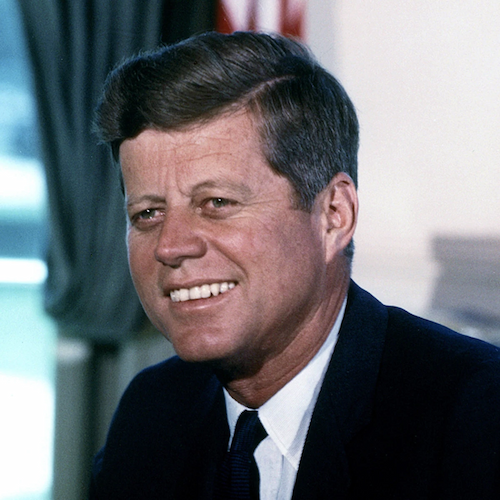John Fitzgerald Kennedy was the 35th President of the United States from 1961 to 1963. He is known by his initials “JFK.”
Early Life
Kennedy was born to a wealthy family on May 29, 1917, in Brookline, Massachusetts. He was one of nine children born to Joseph P. Kennedy Sr. and Rose Fitzgerald. Joseph later served as the first Chairman of the Securities and Exchange Commission and Ambassador to the United Kingdom. Rose’s father, John F. Fitzgerald was a Mayor of Boston.
John Kennedy attended Harvard College and joined the U.S. Navy during World War II. In 1943, a Japanese destroyer sank his patrol torpedo (PT) boat and he saved his crew. He married Jacqueline Bouvier in 1953 and they had four children, only two of whom survived to adulthood. In 1957, he won the Pulitzer Prize in biography for his written work “Profiles in Courage.”
Kennedy served three terms in the House of Representatives from 1947-1953, advocating for better work conditions, more public housing, higher wages, and cheaper rent. He served in the U.S. Senate from 1953 to 1960.
Millions watched Kennedy and his Republican opponent, Richard Nixon in the first televised presidential debates. Kennedy won the election on a very narrow margin. The country was excited to have a young and charismatic leader.
Presidency
Kennedy was the first Roman Catholic and the youngest man elected to the presidency. He said in his inaugural speech, “Ask not what your country can do for you. Ask what you can do for your country.” He appointed his brother, Robert F. Kennedy to be Attorney General.
Kennedy pushed for civil rights legislation that ultimately became law after his death. He oversaw the creation of the Peace Corps. He announced the goal of landing a man on the Moon before 1970. His White House events promoted the arts and culture.
During the years of the Cold War, the Soviet Union and Cuba dominated his foreign policy. He approved the failed Bay of Pigs invasion that attempted to overthrow Fidel Castro. He increased the number of U.S. military advisers to help South Vietnam defeat North Vietnam. In the October 1962 Cuban Missile Crisis, he stood up to the Soviets who wanted to install nuclear missiles in Cuba. The nation feared a nuclear war until the Soviets backed down.
Death
Kennedy was assassinated on November 22, 1963, while riding with his wife in a motorcade in Dallas, Texas. He was buried in Arlington National Cemetery. Conspiracies about the truth of the assassination still linger today.





